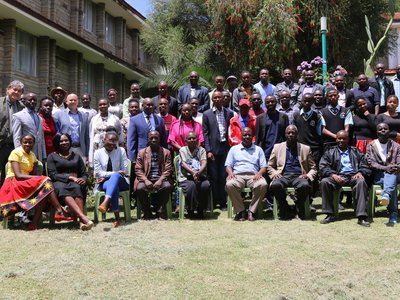

The SCARA Symposium on ICT and innovations in agriculture, “Creating the Future Together“ under the APPEAR project “Strengthening Capacities for Agricultural Education, Research & Adoption in Kenya (SCARA)”, took place from 27th to 28th of September 2019 at Egerton University, Njoro Campus. More than 70 participants discussed and deliberated on the topics ICT, digital agriculture, socio-cultural and gender issues and agricultural sustainability during times of transition in the agricultural industry in Africa driven by the increased adoption of technology on different frontiers.
Key notes on mentioned topics were provided by Alexander Valento, CEO of YielderKE, Dr. Joel Onyango from the African Centre for Technological Studies and Dennis Tianta from Agrisolve Detawald. The participants, representing different stakeholder groups from farmers, extension agents, scientist, NGOs, developers, media and high school students used the opportunity of direct stakeholder interaction to develop new visions for ICT and youth in agriculture and find new and innovative ways for knowledge creation and sharing. In the sessions “Idea generation” and “decision making” challenges and opportunities of ICT were identified which can show the way into a new digital age in agriculture. The role of youth was found to be of paramount importance in future as education becomes more and more important for both the youth and their parents. Young people are more interested in well paid jobs than looking for employment in the agricultural sector. However, unemployment rates among young Kenyans are increasing. Either food production has to intensify to meet the increasing demands of a growing population with fewer active people in the food production sector or new ways of agricultural production have to attract young innovative Kenyans. Youth in agriculture has to find their niche to be innovative. Youth need to be aware that there are plenty of opportunities along the value chain in Kenya. On the other hand, a large group of Kenyan farmers, young and old, have a different more conservative perspective on agriculture.
Only 28% of rural farmers in Kenya have access to a smartphone. What about those, among many of them are female farmers, who don't have access? The digital divide is a major threat to those farmers. Feature phones and SMS is a solution but for rural farmers radio and TV are major sources of information on weather, market, laws and emerging trends. ICT include a wide range of tools to disseminate information to end-users and provides opportunity to interact between involved stakeholders. ICT platforms have the capacity to enable farmers to access information on product pricing and local markets, source for inputs and weather conditions. However, discussion cannot be solely about the use of ICT in agriculture which should enable farmers to access relevant information. Information has to be accessible but also in a format that makes it usable for users. But it is also a matter of trust. Farmers are questioning whether the information they receive is legit. Farmers prefer to have different sources and cross-check even with people they know and trust. Limited access to internet services and access to transport for important market access also remains a big issue. The role of the Government is clear, and this has to include the provision of enabling environment, especially for marginalized groups, and support systems and policies that support innovations and ICT-driven ideas at small & medium enterprise and capacity building in ICT. Development of ICT for agricultural services requires a substantial budget and investment. Mindset of users is often "smartphone apps have to be free of charge". This is economically unsustainable for many developers and startups in Kenya.
Research should be connected to solving actual problems and put into practice by practitioners considering the respective context. Integration of ICT in teaching agriculture has been found to be effective in instructional delivery strategies in the aspects of crop production, livestock production, soil science, agricultural economics and agricultural engineering. Agriculture in Kneya is no longer just about crop production or livestock farming activities. Young learners must be prepared to deploy ICT in countering the challenges brought forth by ecological factors affecting the environment. Hence the role universities play in this area is important not only with a strong focus on research on ICT and agriculture and to produce specific sets of data but also integrate ICT, digital data management and the role of innovations in agriculture in their curriculum. Success of agriculture in Kenya also lies on the shoulders of tech savvy youth. Youth should take the responsibility and look for opportunities and knowledge and this is certainly a key role and responsibility of universities to create enabling environments as well.
The SCARA symposium was organized with the intention to create a wider forum for stakeholders to share visions and challenges on ICT and agriculture in Kenya. It certainly laid the foundation for a platform for interactions on these pertinent topics. The main priorities identified by the “idea generation” sessions were “training of end-users on ICT”, “focus on small holder farmers”, “improvement of existing mobile apps by developers in cooperation with farmers”. All involved stakeholders are invited to join hands and forces to create a better future for all in the agricultural sector in Kenya.
